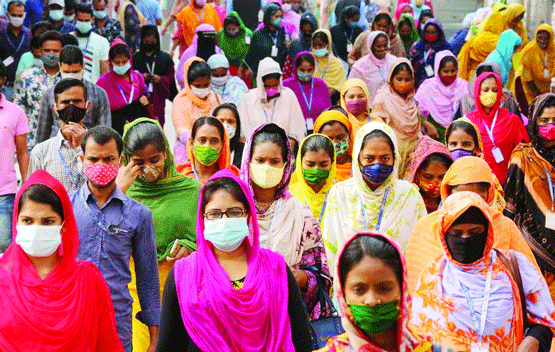Garment workers concerned about their safety during Covid : Survey
Staff Correspondent: Some 84 per cent of the country’s garment workers had worries about Covid-19 pandemic during the first week of last month when they were called back to work amid a strict nationwide lockdown with the virus still surging.
This was revealed in a recent survey jointly conducted by South Asian Network on Economic Modelling (SANEM) and Microfinance Opportunities (MFO) under a project titled “Garment Worker Diaries” to collect data on the working conditions, income, expenditure, food security, wage digitization, and health of garment workers of Bangladesh.
The report mentioned that during the first week of August, garment workers were recalled to work amid the unexpected easing of the national lockdown.
On August 6, garment workers were asked about how they felt about being recalled to work with the lockdown still in place.
Some 84 per cent of the participants responded that they were concerned about the state of Covid-19 in Bangladesh.
During the first week after being recalled to work, the number of workers present was slightly lower than they usually are, according to the survey.
On August 6, 83 per cent of the respondents replied that they had gone to work the previous week.
A slightly smaller share of women worked than men, 81 per cent compared to 89 per cent respectively.
The main objective of this project is to aid informed policy-making and brand initiatives, with regular and credible data collection and analysis, which can have a positive impact on the lives of the country’s garment workers.
As part of the project, SANEM and MFO have been collecting monthly data since April 2020 of garment workers employed in factories across the five main industrial areas of Bangladesh (Chittagong, Dhaka City, Gazipur, Narayanganj, and Savar).
The data used for the analysis presented in the recent survey come from interviews conducted over the phone on August 6, 2021, with a pool of 1,278 workers.
Of the working respondents, just over three-quarters are women, which is roughly representative of workers in the sector as a whole.
The survey focused on the effects of lockdown on garment workers and their feelings about the current state of their workplace safety and the prospect of more or less pay in their upcoming pay checks.
Among those 83 per cent of respondents who had worked in the survey week, only 44 per cent told that they were comfortable going to work during the national lockdown.
Among those same working respondents, unfortunately, only 45 per cent were given a mask to wear while working. On a more positive note, 77 per cent of those working respondents told us they had been able to socially distance while working in the factory.
When asked about measures beyond mask-wearing and social distancing, only 47 per cent of respondents told that their factory had taken additional steps to prevent COVID-19 infections.
Among those 47 per cent respondents, 83 per cent thought that the additional measures taken were adequate. Although the responses of men and women were very similar in almost all questions, they differed on this issue.
Eighty-seven per cent of women workers thought of the measures as sufficient, compared to 71 per cent of men.
Asked how much money they expected to receive in their next paycheck, 63 percent of respondents thought they would be paid about the same.
Nineteen per cent weren’t sure how much they’d be paid, while 16 per cent reported that they expected to earn less than normal.
One per cent workers expected to earn more than normal, due almost entirely to having worked more overtime.
Of the 16 per cent of workers who expected to earn less, 75 per cent told that the lower pay would be lockdown-related. When asked how they are planning to cope with less money, the most common answer with 18 per cent identifying this option was to cut back on food expenses.
Among the rest, 18 per cent would get by with less pay by managing with some other type of coping strategy, 16 per cent would cut back on other expenses, 13 per cent would rely on transfers from family outside the household, 12 per cent would rely on transfers from friends outside the household, 11 per cent said other household family members would take on more expenses, nine per cent said they would dip into their savings, four per cent would rely on transfers from other household members and one per cent said they would pay their rent late.
The data indicate that workers don’t feel secured about their workplace environment and factory owners had not done enough to make them feel less concerned.
Workers are getting to work with uncertainty about their future economic security.
In this situation, relevant authorities need to take adequate steps to ensure the safety of their workers and address the concerns of their employees.
To facilitate the recovery process of the RMG sector, export, and the economy as a whole, it is important for factory owners, government officials, policymakers, and advocacy groups to come together to prioritize the safety and wellbeing of workers, according to the survey.
Rare Israeli airstrike in Beirut kills Hezbollah commander and more than a dozen others
International Desk: Israel launched a rare airstrike that killed a senior Hezbollah milita…








